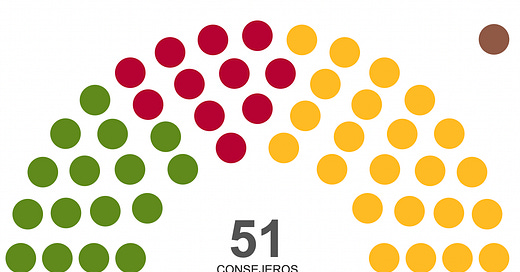Chile - Conservatives now control the constitutional rewrite
The political incentives for both sides should be to successfully write a moderate and modest new constitution. But can Boric and Kast recognize that it's in their best interest?

In the vote for the new Constitutional Council, Chile's rightwing parties combined to win 56% of the vote and two-thirds of the seats in the new constitutional body. The far-right Republican Party of former presidential candidate José Antonio Kast won 23 seats and center-right Chile Seguro won 11 seats. Unidad para Chile—the center-left coalition closest to Boric, but still more moderate than the president—won 16 seats. With fewer than one-third of the seats, the left will have no ability to veto proposals on their own. By contrast, the Republicans have enough seats to veto any attempt at a more centrist coalition.
This has led many political observers to ask: What does this mean for Chile's presidential election in 2025?
On one hand, that’s absurd. Writing and passing a new constitution before the end of this year is far more important than gaming out an election that is more than two years away. Yet, many of the decisions in the Constitutional Council in the coming months will be shaped by the question of who will win the next presidential term.
The region remains in an anti-incumbent environment. Boric is unpopular. His policy agenda is floundering. Even if the economy recovers, it will not do so in time to rescue his administration before it becomes a lame duck. If this constitutional rewrite didn't exist, the left would be doomed in the 2025 election.
It's simple and sometimes even fun to be a part of the opposition in an anti-incumbent environment, firing criticisms at an unpopular president until the next election rolls around without the burden of being responsible for outcomes. But now, with this Constitutional Council, Chile's right-wing opposition has a governing job and a spotlight on their every action. And given their two-thirds majority, they can't blame the left if they fail.
Chile now has two incumbent coalitions, one on the left controlling the executive branch and one on the right controlling the constitutional rewrite. If the right screws this up, even though they don't control the presidency, they could be next to fall victim to the anti-incumbent wave.
The challenge with the first constitutional convention was that the members failed to acknowledge the overall political environment and overreached with their proposals. This convention could fail for the same reasons, but the looming next election means the incentives around failure due to overreach are more complicated.
If the Republican Party comes at this constitutional convention with an attitude of "let's ban abortion and enshrine private pensions in the constitution," that constitutional draft will undoubtedly be rejected later this year. Of course, maybe that's what they want. Over-reaching with a right-wing constitution and having it fail would maintain the current right-wing constitution in place, something the Republican Party would support. From that perspective, they are in a win-win situation.
However, if the Republican Party overreaches, they won't just get a rejected constitution. They'll also beat down their own image before the next national election, potentially giving the left a chance to win, and potentially even win big, in an environment in which they would have almost certainly lost. The members of the last constitutional convention didn't care about their image or political future because most of them weren't politicians. This rewrite will be defined by the elite political class, and they certainly care about how their success or failure translates into future elections.
Meanwhile, Boric, who was elected in part to guide a new constitution to fruition, does not want to end up in the awkward position of opposing constitutional reform when this whole thing is over. It would destroy any chance at a legacy, and it would hurt his political coalition's chances in 2025.
All of this should in theory create incentives for the sides to work together to succeed in a moderate and modest constitutional reform. Then both sides get to claim victory. The extremists in their coalitions will complain, but the middle of Chile's political spectrum will support the reform, and ultimately the next president needs to win over the median voter to win. The competition over the 2025 election gives both sides reason to pass a new and good constitution.
Does this guarantee success? Of course not. Politicians act against their best interests all the time. Chile's polarization will push both sides to try to "win" a Pyrrhic victory over the other at the cost of losing support with the public. There are plenty of scenarios in which this fails. But failure means a failure for both "incumbent" sides. The public has given both sides of the political spectrum immense power to shape the country and expects results from both. If both fail simultaneously, that won't lead to a responsible, technocratic centrist coalition gaining ground. Instead, it lays the groundwork for even further anti-system candidates to jump into the mix in future elections.
Kast and Boric should recognize that their political fates and Chile's success are now interwoven. The two sides dislike each other, but they are incentivized to work together on this issue. For the sake of Chile, let's hope they take that opportunity.


